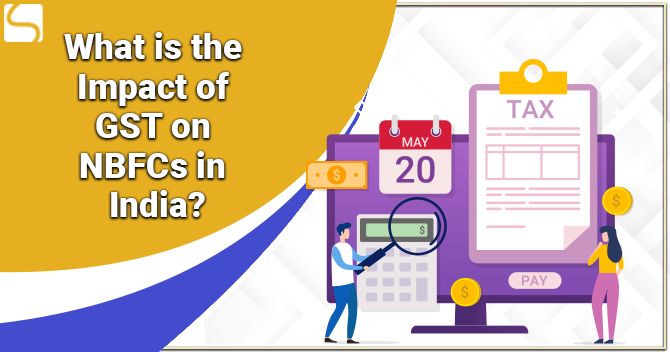What is the Impact of GST on NBFCs in India?

Karan Singh | Updated: Jan 25, 2021 | Category: NBFC
The introduction of GST (Good and Services Tax) has been a huge innovation in the history of the tax regime in India. With GST replacing the old indirect tax regime applicable in India, a more inclusive and unchanging system has been placed for businesses and allows them to manage their liability on tax more effectively. With this revolutionary change in the tax regime, the impact of GST on NBFCs and Banks has made. Among the services offered by Non-Banking Financial Companies and Banks such as fee-based, fund-based, and insurance-based services will see a major impact of GST on NBFCs and other financial institutions in India. Under the GST Law, the context doesn’t offer many benefits to Non-Banking Financial Companies and Banks on understanding the transactions type made by them on a reliable basis. Scroll down to check more information regarding the impact of GST on NBFCs in India.
Table of Contents
Meaning of NBFC (Non-Banking Financial Company)
NBFC stands for Non-Banking Financial Company is a registered company under the Companies act, 1956[1] involved in the business of advances & loans, acquisition of stocks/securities/bonds/shares/debentures issued by Local authority or Government of India or any other marketable securities such as leasing, insurance business, chit businesses but it does not include any institution whose primary business is that of industrial, agricultural activities, purchase/sale of any goods or offering any services and construction/purchase/sale of a secure property. If anyone wants to establish a financial company like NBFC, for that the applicant needs to apply for the NBFC License and get a certificate from RBI (Reserve Bank of India). Without the Registration Certificate of NBFC, it is impossible to run a Non-Banking Financial Company in India, and you may face punishment.
Impact of GST on NBFCs in India
The GST rule has carried a collection of changes to the tax liability of NBFCs in India. Earlier, under the several indirect tax system, lending services extended by Non-Banking Financial Companies were primarily exempted from indirect taxes. Central Service tax was charged only to a certain level without considering the place where the services were extended. But, the change in tax regime introduced the new provisions for Non-Banking Financial Companies regarding the GST Registration, GST Rates, Input Tax Credit and place of services supply. Following is the list of the impact of GST on NBFCs in India.
- The new GST rate for services regarding Non-Banking Financial Companies has been increased to 18%.
- It is compulsory for Non-Banking Financial Company to obtain GST Registration in India in every state where it has a branch.
- Inter-state supplies of services between different NBFC branches are liable for GST.
- Also, the number of GST Return Filing has been increased in each state.
In direction to recognize the impact of GST on NBFCs in India, it is also important to understand the ambit of financial services in India.
Financial services with respect to NBFCs involve the following set of activities:
- Giving Loans.
- Hire Purchase.
- Conditional Sales.
- Lease.
- Securitization or assignment of receivables.
- Conditional Sales.
- Sale or acquisition of shares and securities.
What are the different challenges posed by GST before NBFCs in India?
While the impact of GST on NBFCs in India has directed to various benefits for financial companies, and there are some challenges which have been posted before them. These challenges consist:
- Multiple Registration under GST: The most negative impact of GST on NBFCs is compulsorily required GST registration for each branch in all different states of India. In the previous GST model, the Non-Banking financial Companies require only single central registration to operate all over the country.
- Increased Requirements for Invoicing: Under the CGST Act, Section 25 needs a business to submit or upload all the invoices of the business at the time of GST Return Filing. This requires a Non-Banking Financial Company to create and record an invoice for all the transactions it performs regarding the loan process, late payment penalties, commissions, capital goods, etc. The NBFC also make sure the details accuracy and upload the documents digitally, and this can be a discouraging task for a Non-Banking Financial Company which operated on a massive scale and processes huge loan applications every day.
- Various GST returns Filing Requirements: The new provision of several registrations has left an opposing impact of GST on NBFCs as it has greatly amplified the several compliances and GST Return Filings for them. Subsequently, the impact of GST on NBFCs has led to a greater number of invoicing and documentation of transactions as they are needed to present proof for its tax liability.
- Difficulties in Adjudication and Assessment: Because of the jurisdiction of more than single GST Authority over the Non-Banking Financial Company in case of multi-state operations, it would be difficult to assess and adjudicate any legal disputes since different authorities may grip various opinions in the matter.
- Carry: Forward Extra Duties: In this duties of Cess such as Secondary & Higher Education Cess, Krishi Kalyan Cess, the cash flow of Non-Banking Financial Company may get obstructed if the business faces any legal action.
- Account and Non-Account Linked Financial Services: The impact of GST on NBFCs linked to the provisions of maintenance of records in connection to the place of supply is resulting to be ineffective. Non-Banking Financial Companies in India are accepting online operations and offering their services all over the country. On the other hand, Non-Banking Financial Company functioning form various branches in different states and finds it very difficult to commence the supply place and for non-account linked financial services, Non-Banking Financial Company faces enormous confusion in founding the place of supply.
Conclusion
It is cleared that the implementation of new tax laws has left a mixed impact of GST on NBFCs in India, but the pros surely outweigh the cons. In the future Non-Banking Financial Companies would reduce the burden on the tax of NBFCs in India and the NBFC businesses in India need to be more vigilant of their transactions and records to make sure that they hold proofs of all the transactions. If you want to gain more information regarding NBFC Registration and GST registration, you can contact Swarit Advisors.
Also, Read: A Complete Summary of NBFC Compliance under FEMA















